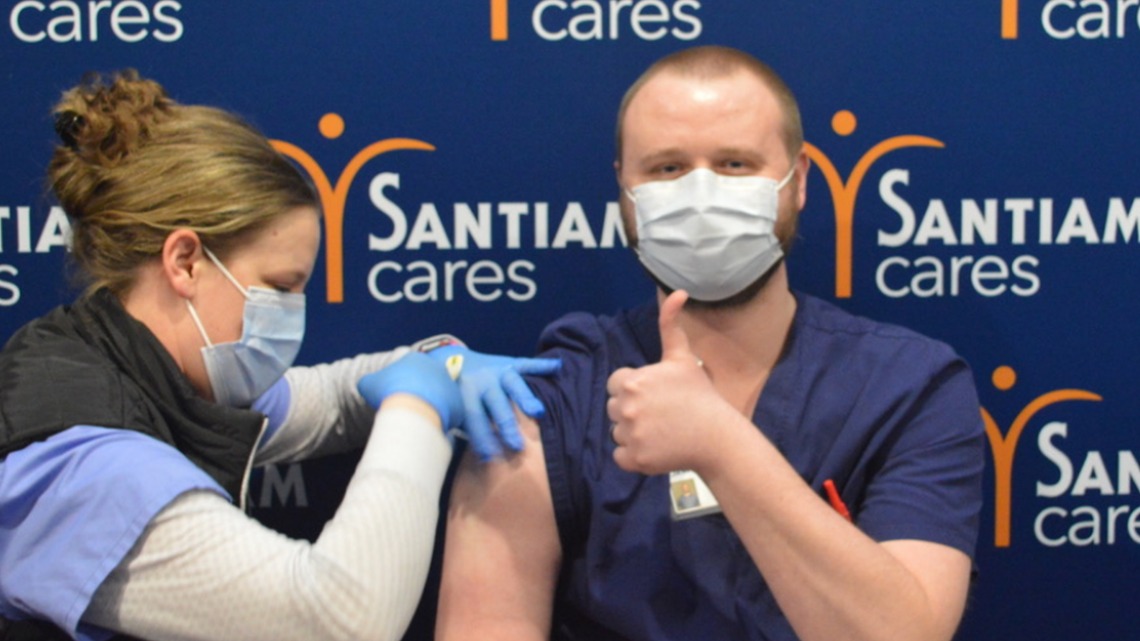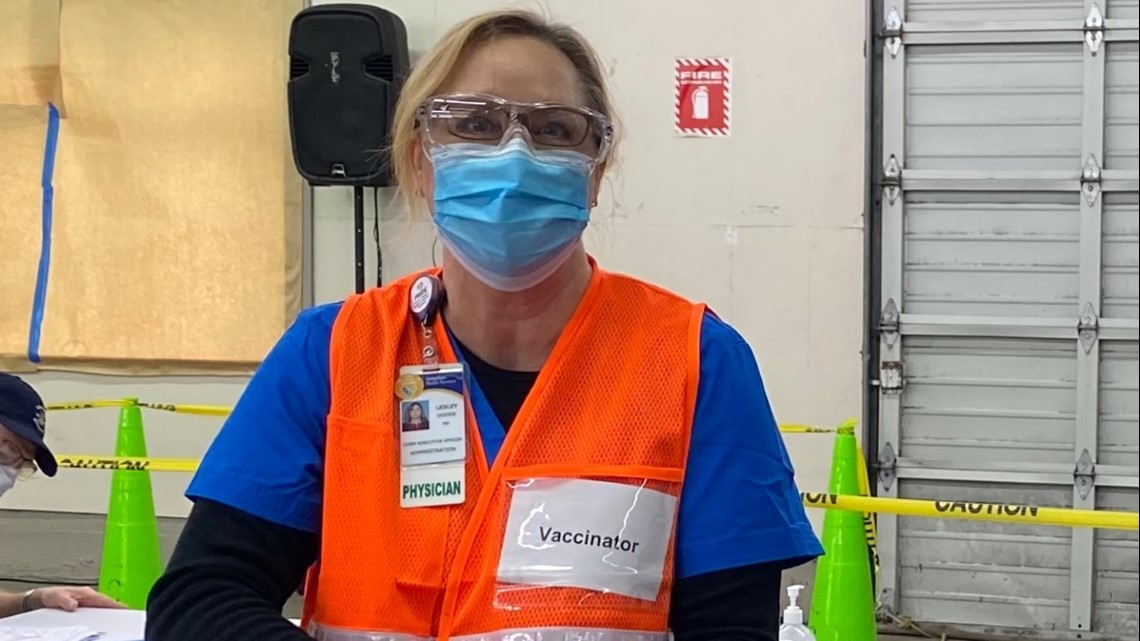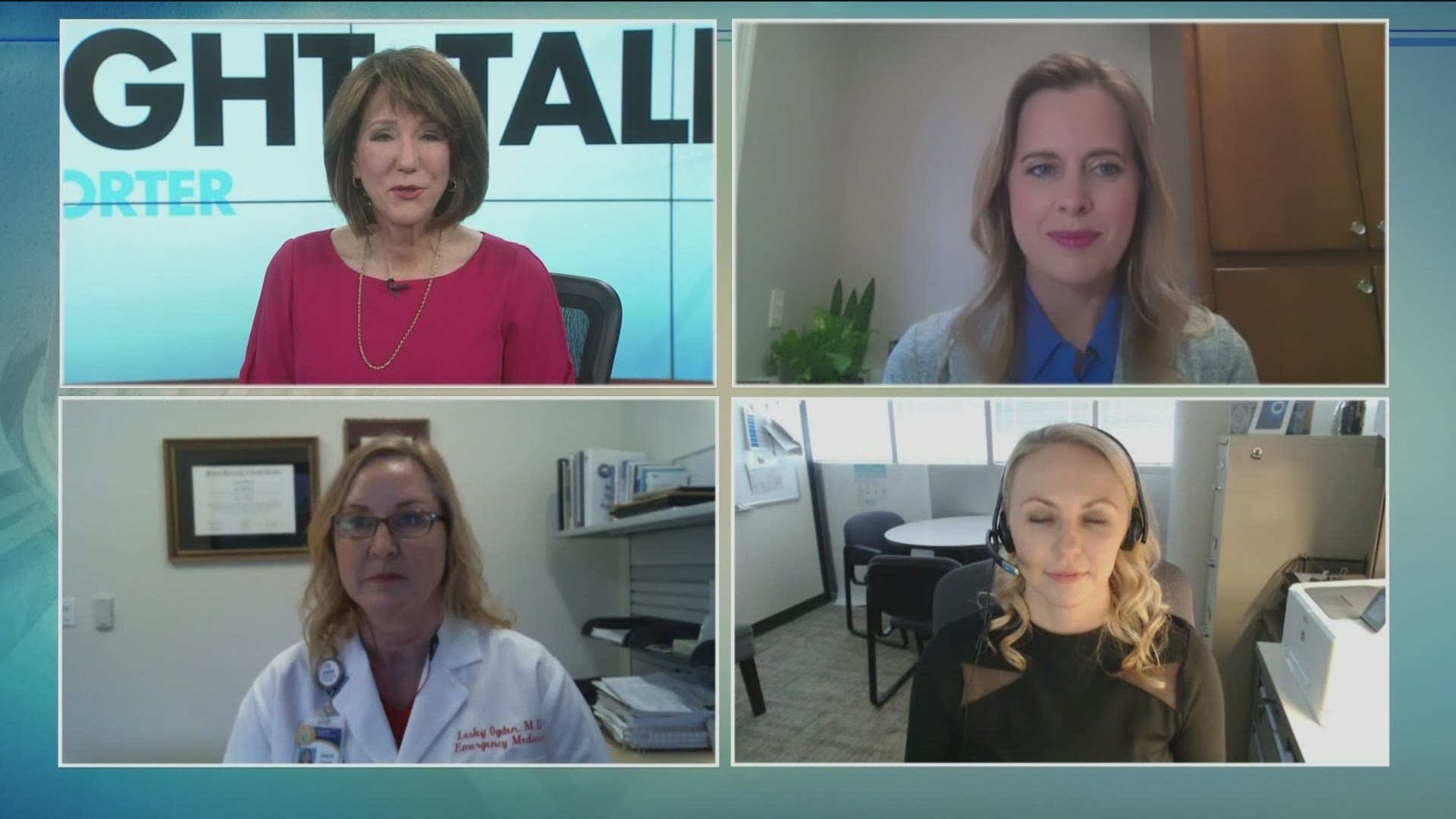PORTLAND, Ore. — When the pandemic hit the Pacific Northwest, Dr. Lesley Ogden wondered if the two hospitals she leads would survive. The CEO of Samaritan hospitals in Lincoln City and Newport worried about a COVID-19 case surge and when it would come.
When the pandemic forced the cancellation of elective procedures, the backbone of revenue stability for the hospitals, she wasn't sure they could recover financially. And she wasn't certain she would even have a job when the pandemic ended.
"We were thinking the whole time, 'Are we ever going to come out on the other end? Is this survivable?" Ogden said.
Katrina Rothenberger's county endured three emergency declarations in 12 months. Against the backdrop of the pandemic, Marion County was also devastated by the wildfires in September and the ice storm in February. As the director of public health for the county, she also worried about her own family.
"One of the hardest things was balancing the health and safety of my family, and deciding to send my daughter back to pre-school as a global pandemic is unfolding," she said.
Becky Hultberg had just taken the job as CEO of the Oregon Association of Hospitals and Health Systems when the pandemic hit. She had left a similar position in Alaska and was separated from her family for the first three months of the year.
"It is so hard to capture the last year in words," Hultberg said. "I think if I tried to capture it, it would be two words: heavy and hopeful."
All three women helped lead Oregon's health care system through the past year of the pandemic. In this week's episode of "Straight Talk with Laural Porter," they reflect on the past year, what we've learned and what may lie ahead.
'Heavy but hopeful'
While Hultberg said the year has been "heavy," she focused on the hopefulness.
"Who would have thought a year into the pandemic we would have vaccinated our millionth Oregonian," she said. "That is really hopeful and I think it's important to keep sight of that hope."
More than 1 million people have received at least one dose of the COVID-19 vaccine, according to the Oregon Health Authority. More than 600,000 people are considered fully vaccinated.
Marion County Public Health director Katrina Rothenberger agreed and said her community has grown a lot through the past 12 months.
"We have come together to support each other through three natural disasters," she said. "And I am so proud to live here and so proud of our community partners."
Vaccines bring hope
Dr. Ogden not only serves as CEO of Samaritan hospitals in Lincoln City and Newport, she is also an emergency medicine physician by training and spent 10 years in emergency care on the coast. And she's helping to administer vaccines. She has seen the hope that the vaccine offers overwhelm people with emotion.
"The hopefulness is unbelievable," she said. "I have seen people break down in tears, just thankful they can get out of the house. That they have hope to see their family. Some of the folks are going to see their grandchildren for the first time in a year."
Ogden encouraged people to volunteer at a clinic if they can.
"If you want to see a happy day happen, get involved in volunteering at your local vaccine clinics, because it's amazing," she said.
Marion County vaccine rollout praised
Rothenberger and Marion County have been praised for the efficiency of their vaccine rollout. She said it is the result of years of planning and partnerships preparing for an emergency.
She said they started planning for vaccine distribution 11 months ago. It included table-top exercises with community partners. 150 people joined in for five sessions.
"The successful rollout is really due to all our partnerships," she said. "Our hospitals, fire districts, ambulance partners, and we have lots of different strategies."
Marion County has a drive-thru clinic in Woodburn, mobile clinics, the mass vaccination clinic at the state fairgrounds, pharmacies are giving shots, and they are doing some home visits.


Hospitals hit a low with cancellation of elective procedures
While there is hope now, it was hard to see at the start of the pandemic.
For hospitals, a low point came when Oregon Gov. Kate Brown ordered the cancellation of all elective procedures. For many hospitals, those elective surgeries are a large driver of revenue.
Hultberg, who works with the state's hospitals and health systems, saw first-hand how hard it was for many hospitals, especially in rural Oregon. She said the bottom dropped out.
"It was such a challenge," she said. "Although so much was unknown, and at the time it seemed like the right decision, what it really did, it completely undercut the finances of hospitals."
It was an unsettling time for many hospitals that came within weeks of running out of money to stay afloat.
"I remember saying to my team at the time, 'Victory at the end of this year may be that we don't have a hospital close,'" she said.
Dr. Lesley Ogden said it was a close call for the brand new Samaritan hospitals in Lincoln City and Newport. She said the community is proud of all the work, and the 10-15 years that went in to opening the new facilities.
But with the cancellation of elective surgeries and then the evacuation of the Lincoln City hospital due to the wildfires, the future looked grim.
"We were really questioning, 'Are our hospitals going to be here when we come out of this?'" Ogden said.
But, federal money from the CARES coronavirus relief package and state funding helped Oregon's hospitals survive.
"We navigated through it," Hutberg said. "And the people in those communities did not lose care, but for a while, it was a real concern."
Hospitals step up for vaccine distribution
When vaccines became available in December and January, and with no national plan for vaccine distribution, hospitals stepped up to help administer the Pfizer and Moderna shots.
Hultberg said hospitals, in coordination with public health, had a laser focus on the priority of the moment: Getting the vaccine out to Oregonians.
“I think some of the efforts that were stood up--and stood up pretty quickly--like the fairgrounds, the Oregon Convention Center, the efforts of Samaritan and the counties they serve were nothing short of amazing from a logistical standpoint,” Hultberg said.
'Crazy patchwork quilt'
Dr. Ogden called the early days of the pandemic “a crazy patchwork quilt” when it came to states’ responses to the health emergency.
“Not only how we handled the pandemic, but to how we did everything," she said. "From PPE to testing, to everything. It was hospitals and health systems and states defining everything on their own and reinventing the wheel time after time after time.”
She said they are doing it again with vaccines.
“Don’t get me wrong, there are people doing amazing work and we are getting it done, but that is with no help from a really coordinating entity," she said. "It has been quite a job to do."
Ogden said a coordinated national response would have made things profoundly easier.
Preparing for the future
Hultberg is looking ahead to the potential of a future emergency and hopes the state and nation can learn lessons from this experience.
In a year that has not only brought a global pandemic, but also devastating wildfires and a historic ice storm to Oregon, Hultberg said it underscores the need to prepare and improve the response for the future.
“I think one of the things that will be really important as we get beyond this vaccination push, to a point where we are in a new normal, is to look back and say, 'What did we do right? What went really well? How do we codify that? And where did we stumble and how can we improve?'" Hultberg said.
Vaccine rollout and virus variants
Health leaders are concerned and carefully watching several coronavirus variants that could have the potential to be more transmissible. They have caused global concern over whether current vaccines can protect people from a virus that is continually mutating.
“I think all of us are very concerned,” said Dr. Ogden. “I think with some of them we have some good data that our vaccines will cover the variants and work well against them. But in some other cases, we are not so sure."
Ogden said it may mean people will need yearly booster shots to target some of the variants, much like with yearly flu shots that target circulating types of the virus.
“We don’t know where this is going," she said. "We don’t know if all our hopes and dreams for the vaccine are going to take us where we hope it might go... so yet to be determined.”
Marion County’s Katrina Rothenberger described it as a race against time to get vaccines into arms faster than the virus variants can spread through the community.
“So what I want really want to see is vaccines into arms quickly, so these variants don’t have the time, so the COVID virus doesn’t have the time, to mutate and spread here locally,” Rothenberger said.
Vaccine hesitancy
For people who are hesitant to get the vaccine, Dr. Ogden wants to put their minds at ease about the safety and efficacy of the shots.
“These things are well tested," she said. "They work very, very well and there’s very little actually in medicine that is such a sure thing as we are seeing with these vaccines."


Nearly every physician Ogden knows has taken the vaccine already. She thinks that should help persuade others the vaccine is safe.
“The scientists, the physicians amongst us are absolutely standing behind the vaccine," she said. "We are amazed at what we have done in a year, that we have come up with a vaccine that has efficacy in the 94th to 95th percent area. We have never seen a vaccine this effective."
Rothenberger said it’s also important to meet people with compassion who might be hesitant to get the vaccine. She said it can be scary to some that the vaccine was developed so quickly. But she also assures people the vaccines went through a rigorous process and clinical trials before being approved.
“They have enrolled more people in these clinical trials than they typically do for other vaccine studies,” she said.
Rothenberger also pointed out that, in addition to the FDA oversight, the Western States Pact reviewed the vaccines, adding an extra layer of assurance about their safety. She said she’s seeing people who were once reluctant to get the vaccines change their minds as they see family and friends decide to get the shots.
“They’re saying, ‘Oh, I wasn’t going to get the vaccine at first, but my friends and family didn’t have an issue. Side effects were at a minimum, so I think I am going to get it now,'” she said.
Rothenberger said she’s had the Moderna vaccine and that when there’s a vaccine approved for children, she is looking forward to getting her 5-year-old daughter vaccinated.
Oregon hospitals ask Legislature for time to recover
The Oregon Legislature is considering a host of bills that would add further regulation to the state's hospitals.
Hultberg represents hospitals and health systems as the head of the Oregon Association of Hospitals and Health Systems. She said the hospitals need time to recover once the pandemic is over before adding new regulations.
"Many of these proposals are well-intentioned," she said. "We understand them. Unfortunately, they have a cumulative impact on the system itself. Some of them would create additional burden and additional hardship at a time when the system is not in a position to absorb it."
Hospital bills before the Legislature
There are several bills the Oregon Legislature is considering:
- HB2362 requires health care entities to get approval from the Oregon Health Authority before any mergers, acquisitions of a certain value.
- HB2622 requires hospitals and ambulatory surgical centers to use smoke evacuation systems during surgical procedures likely to generate surgical smoke.
- HB2348 requires hospitals and long-term care facilities to make plant-based food and beverages available to patients, staff, residents and visitors.
- HB 3016 adds requirements for suspension of a hospital nurse staffing plan during a national or state emergency declaration.
Ogden said her hospitals in Lincoln City and Newport are just fighting to stay afloat for their communities and the people they care for.
"Boy, we would just like a breather," she said. “We would like a chance to recover from this, to get through this, and to continue to care for our patients with less regulation," Ogden said.
Instead of passing laws requiring more regulation, Dr. Ogden would like to see the stakeholders come to the table to figure out some ways to advance some of the goals included in the bills without legislative oversight.
Women in health care leadership roles
In the spirit of Women’s History Month, the three women health care leaders reflected on the progress women have made in their field.
Rothenberger, the public health director for Marion County said women play a strong role in public health in Oregon. She encouraged other women to consider a career in public health.
“It’s really fun and we get to do a lot of cool things, and we have a really important role to play," she said. "I hope young girls watching this, including my daughter, know that their voice makes a difference and they can achieve anything they want to, including in the realm of science and public health.”
Hultberg, who leads the Oregon Association of Hospitals and Health Systems, said when she got into the field there weren’t many women who were running hospitals or associations. But in the last 10 years, she said, there has been incredible progress.
“We have seen women in leadership roles in hospitals,” Hultberg said. "We have women running associations. Our governor is a woman. In all these leadership roles, women are excelling. It’s great to be able to see that and to be able to support each other in these leadership roles."
Dr. Lesley Ogden, the CEO of Samaritan hospitals in Lincoln City and Newport, said women in her field reached a historical landmark in 2019. Women now outnumber men in medical school enrollment.
“We are finally seeing women really playing a majority role in the health care of the future," she said. "And I am very excited about that possibility about empathy, compassion and a lot of good things that come along with extra spades with women in those roles."
'Keep up the good fight'
Hultberg had one last message for people as we push through the final stages of the pandemic.
“I want to encourage people to keep up the good fight,” she said.
Although the pandemic is not over, Hultberg said there is hope on the horizon.
“So, let’s keep doing all of the things we need to do to keep each other safe, so hopefully this summer we can get back a new normal,” she said.
Straight Talk airs Friday at 7 p.m., Sunday at 6:30 p.m. and Monday at 4:30 a.m. Straight Talk is also available as a podcast.

